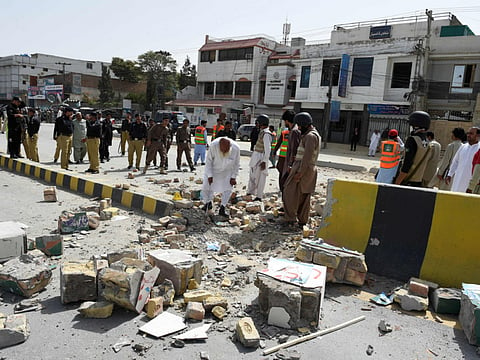Quetta attacks send alarm bells ringing
In Pakistan’s Balochistan province, lack of empowerment, ethnic rivalries, poor academic infrastructure and law and order problems need far better resolution

What took place is tragically clear. On 8 August in Quetta, capital of the Pakistani province of Balochistan bordering both Afghanistan and Iran, the respected leader of the lawyers’ association was shot and killed in the morning and taken to hospital.
Members of the legal fraternity rushed there, congregating around the entrance. They were targeted by a suicide bomber killing seventy-four, mainly lawyers and some members of the media, and injuring over one hundred more. Probably the assassination and the suicide bombing were part of a plan. Tragically this possibility was not foreseen by the authorities despite a pattern of terrorist attacks in Afghanistan, Pakistan, and elsewhere making gatherings, crowds, and demonstrations targets of opportunity.
The Jamaat ul Ahraar, a terrorist organisation, and Daesh (the self-proclaimed Islamic State of Iraq and the Levant) claimed responsibility. The JuA is reportedly linked to the Tehreek e Taliban Pakistan (TTP) now based in Afghanistan after being dislodged from its former sanctuaries on the Pakistan side of the border. The last major attack claimed by the JuA was in a Lahore park on Easter Day this March where a large crowd of Christians was celebrating. Seventy-two were killed and over three hundred wounded, many women and children.
The massive TTP attack in December 2014 on the Army Public School in Peshawar which killed 132 young schoolchildren was the turning point, finally forging a public consensus for an all-out attack on terrorism. The army did its part clearing up the border regions; but remnants fled into Afghanistan finding conducive conditions and a sympathetic Afghan intelligence agency traditionally hostile to Pakistan. A National Action Plan was formulated to follow up military gains; but as the army chief cautioned post-Quetta, the slow progress by the government in implementing the NAP is adversely affecting the consolidation phase.
Overall, terrorist attacks have declined in Pakistan, but one objective of the terrorist groups is to demonstrate that despite losing ground they retain the ability to mount sporadic and major attacks to demoralise the public and erode the credibility of government institutions.
Two questions arise: what are the causes for this continuing situation, and what more should be done? The same questions continue to bedevil peoples’, governments’, and law enforcement machinery worldwide. The continuation, indeed the spread of terrorism globally, shows that there are no easy or even complex answers.
In Balochistan, Pakistan’s least developed province with the largest land mass and smallest population problems of empowerment, ethnic rivalries, access to its hydrocarbon and mineral resources, lack of educational infrastructure and law and order shortcomings need far better focus and resolution. The situation is compounded by contiguity to, and the long porous border with, Afghanistan. The large number of undocumented Afghan migrants — let alone refugees — constitutes a security problem by itself. India sees Balochistan as an area of vulnerability to exploit in attempting to ‘manage’ Pakistan; and as a countermove to internal pressure which periodically, as now, builds up in the part of the disputed State of Jammu and Kashmir that it administers.
Another factor is the initiation of the China Pakistan Economic Corridor (CPEC), the $48 billion (Dh176.54 billion) process to develop Pakistan’s energy and communication infrastructure and link it with China. Forces opposed to Pakistan and its links with China consider Balochistan an opportunity to destabilise Pakistan in general and CPEC in particular.
Making a difference
While tackling terrorism requires generation-spanning responses to ideological, developmental, and organisational challenges, a few key actions would make a here and now difference. First of all, progressively controlling the soft 2,560 km border with Afghanistan. A start has been made at the major crossing of Torkham so that entry without visa is no longer possible, despite vehement Afghan objections.
Secondly, notwithstanding the acknowledged need for integrated intelligence sharing, since intelligence agencies everywhere are loath to share their core information - the source of much of their power and influence - or to cede space to new coordinating mechanisms, another approach should be tried. Pakistan already has one of the world’s best databases on its citizens at home and abroad, maintained by the National Database and Registration Authority (NADRA). All national law enforcement and intelligence agencies should pool selective information on all Pakistanis and foreigners in Pakistan with NADRA, so that it and its algorithm-based, pattern-finding techniques can be accessed online by each of them: to identify and locate potential terrorist networks, and to better forestall attacks.
Thirdly, the machine readable CNIC or ID cards issued to all adult Pakistanis have to be improved; and the new higher-priced optional ID cards do not measure up either. The new generation IDs - and vehicle license plates - must be introduced at the soonest and contain passive Radio Frequency Identification chips (RFID) not needing insertion into bar code readers but readable by nearby terminals or portals. That would provide event- and location-based awareness and, given massive but economical parallel process computing power, long-term movement mapping.
Fourthly, setting up small and select covert counterterrorism units to find, target, and decapitate terrorist groups. Pioneered by France in the 1960s using the ‘barbouzes’ or ‘false beards’ of Unit C to counter the OAS, the French right-wing paramilitary group opposed to granting Algeria independence - the most feared urban terrorists of that era. A strategy and tactic refined by others subsequently, including the Algerians themselves half a century later. The drawback, unless subject to strict oversight, is the potential erosion of the state’s moral high ground balanced against the safety of the people and the severity of the threat.
Ambassador Tariq Osman Hyder is a retired Pakistani diplomat.
Sign up for the Daily Briefing
Get the latest news and updates straight to your inbox


